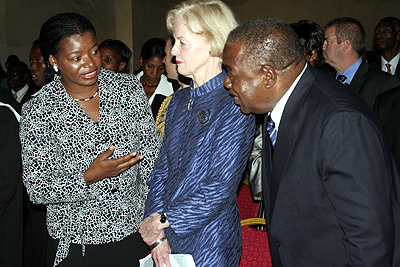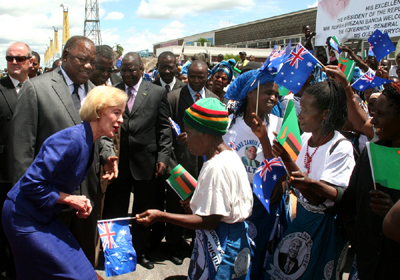Human Rights Watch canes Chinese mines
Notice: Undefined index: catFilterList in /home/zambi/public_html/wp-content/plugins/wp-likes/api.php on line 243
By Derrick Sinjela published on Monday 11th July 2011
MINING firms with Chinese blood are back in the news for flouting labour laws in Zambia a characteristic that marked the last Rupiah Bwezani Banda regime which gave a deaf ear to poor working conditionalities.

President Rupiah Bwezani Banda listens to Tourism Minister Catherine Namugala (l) and Australian Governor General Quentin Bryce at AMEC Matero Township
Following the September 20th 2011 elections which ushered in the Patriotic Front (PF) Government, 5th Republican President Michael Chilufya Sata has put his foot down on the need for Chinese mining firms to respect local labour laws.
The concern raised by President Sata comes in the wake of complaints that flouting of labour regulations arose following the former ruling Movement for Multiparty Democracy (MMD) complicity with Chinese mining firms.
Perhaps it is against this background that a report authored by Human Rights Watch (HRW) blacklists Chinese-run copper mining companies in Zambia for flouting the country’s labour laws and regulations aimed at protecting workers’ safety and has attributed the situation to self-satisfaction by the Rupiah Bwezani Banda administration.
“Chinese-run mines blame their failure to adequately pay local workers on low profits and yet there are reports in their country suggesting that Non-Ferrous Corporation Africa Mining (NFCA), their best overseas firm, makes an annual profit of US$40 million,” cried HRW in a 122-page report entitled ‘You’ll be fired if you refuse: Labour abuses in Zambia’s Chinese State-owned copper mines’ in Lusaka recently.
The HRW report authored by Mathew Wells highlights persistent abuses in the four Chinese-run mines operating in the country, which are subsidiaries of China Non-Ferrous Metals Mining Corporation (CNMC).
The report is based on research conducted during three field missions between November 2010 and July 2011 and draws more than 170 interviews, including from 95 mine workers from the four Chinese mines.
“The report highlighted poor health and safety conditions, regular 12-hour or 18-hour shifts involving arduous labour with insufficient overtime, and anti-union activities which violated Zambia’s national laws or international labour standards. Miners in these companies who spoke to Human Rights Watch repeatedly expressed gratitude to the Chinese investors for their jobs and the enormous investment being made. Yet each measure of praise was invariably followed by a string of complaints about working conditions. While accidents are not unique to Chinese-run mines, nearly all the Zambian workers and union officials who spoke to Human Rights Watch said the Chinese copper operations were the worst when it comes to health and safety,” reads the report in part.

Australian Govornor general Quentin Bryce dancing with MMD cadres at Lusaka international airport as President Rupiah Banda watches.
Miners who sought anonymity at some Chinese-run firms bemoan risking their health by working under demanding conditions for lengths of time that extended beyond what was allowed under the Zambian law or risked being fired.
“The report states that some workers reported spending virtually an entire week handling and inhaling fumes and dust, and that most miners at Sino Metals Leach Zambia and Chambishi Copper
At the Smelter we work in 12-hour shifts, contrary to the eight-hour shifts stipulated in the Zambian laws and standards in every other copper mining and processing operation in the country. Zambian company safety officers attributed their lack of power to stop work in unsafe areas to Chinese managers constantly overruling them and that workers told countless stories of working under threat of being fired should they refuse to work in areas perceived to be dangerous, sometimes with damaged safety gloves or boots,” wrote Wells..
The report indicates that while at least one union existed at each Chinese-owned copper mine, several companies had barred workers from joining the Mineworkers Union of Zambia (MUZ) despite clear provisions in the Zambian labour laws which allowed workers to be represented by a union of their choice.
Union representatives at the Chinese-run firms also described prejudicial acts taken against them for union activities such as verbal dismissal threats to an employee, transfer to jobs outside a union representative’s training expertise and charges likely to lead to deductions on salaries, termination of employment or not renewing contracts.
“The MMD Government under Rupiah Banda appeared to have applied little pressure on the Chinese copper mining companies to meet national and international labour standards owing to a “special relationship” that existed between the Zambian and Chinese Governments. Chinese-run mines blame their failure to adequately pay local workers on low profits and yet there are reports in their country suggesting that NFCA, their best overseas firm, makes an annual profit of $40 million.
Opting for an optimistic future, Wells advised President Sata to put into practice pronouncements on the welfare of workers.
“Human Rights Watch urges the new President Sata Government to adopt the necessary measures to enforce Zambia’s labour laws and to ensure its laws conform to international standards. To begin with, Human Rights Watch recommends that the Government works to improve mine safety by ensuring there is sufficient staffing at the Mines Safety Department,” the report concluded.
MUZ Director of Research Charles Muchimba said while Chinese investment was appreciated, the challenge for the Zambian Government was to enforce a Decent Work Agenda for all categories of workers beyond the mining sectors.
Muchimba fired a gauntlet at the former MMD Government of interfering in labour negotiations, and expressed hope that the Patriotic Front Government would not betray the Zambian worker.























